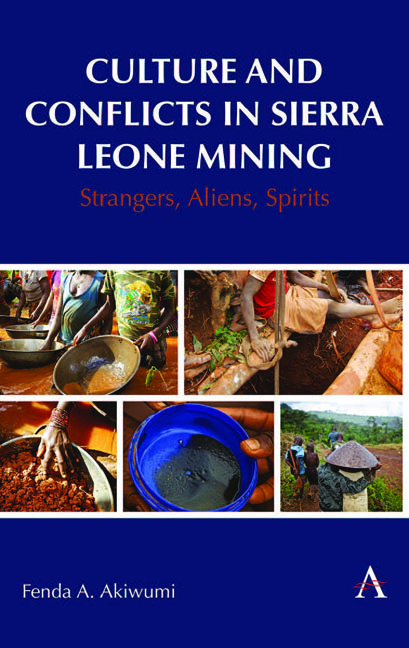Book contents
- Frontmatter
- Dediation
- Contents
- List of Figures and Tables
- Acknowledgements
- Abbreviations
- 1 Introduction: Culture in Commodity Chains
- 2 Sierra Leone’s Global Incorporation Through Mining
- 3 Cultural Difference: Policy and Legislative Dilemmas
- 4 Sacred Places: Local Ontology Meets Global Capital
- 5 Strangers, Environment, and Livelihoods
- 6 Race, Ethnicity, Class, and Gender in Mining
- 7 Between a Rock and a Hard Place
- 8 Conclusion
- References
- Index
7 - Between a Rock and a Hard Place
Published online by Cambridge University Press: 13 April 2024
- Frontmatter
- Dediation
- Contents
- List of Figures and Tables
- Acknowledgements
- Abbreviations
- 1 Introduction: Culture in Commodity Chains
- 2 Sierra Leone’s Global Incorporation Through Mining
- 3 Cultural Difference: Policy and Legislative Dilemmas
- 4 Sacred Places: Local Ontology Meets Global Capital
- 5 Strangers, Environment, and Livelihoods
- 6 Race, Ethnicity, Class, and Gender in Mining
- 7 Between a Rock and a Hard Place
- 8 Conclusion
- References
- Index
Summary
Malfunctions endemic in the existing land rights administration cannot be permanently addressed unless the system as presently established is dismantled and re-engineered. This exercise must recognize the empirical realities associated with operating parallel systems of land rights administration; comprising customary institutions as part and parcel of the social and political organization of territorial groups, and formal systems governed by statutory law. (Govt of Sierra Leone 2015c, 70).
The stories of turmoil discussed here reflect the convoluted and culturally complex relationships developed over the years among landlord-indigene communities, strangers including companies, and the state in mining spaces. Caught between a rock and a hard place are chiefs as traditional governance leaders and government officials of a peripheral country. In colonial history, chiefs are largely accused of oppression, authoritarianism, terrorism, slave trading, and sustaining a gerontocracy that exploits and marginalizes youth. These behaviors were justification to establish a Protectorate under the supervision of Great Britain according to District Commissioner Thomas Alldridge who signed several treaties with chiefs. The creation of the Frontier Police Force in 1893 to enforce this policy was no less ruthless. The force was so feared that locals sometimes abandoned their farms and hid in the forests to escape the intimidation and brutality. The subsequent Protectorate Ordinance established state dominance over the chieftaincy governance which has been in place since. Chiefs govern within the framework of the state and in many ways are caught between their traditional roles and the state's expectations of their leadership (Abraham 2003; Alldridge 1910; Conteh 2013; Fyfe 1962; Peters 2011).
Specific to development projects, chiefs are caught between the forces of tradition and modernity. They both benefit from and object to the actions of development projects like mining. Chiefs frequently protest and petition the national government as we have seen in earlier examples discussed (Akiwumi 2018). Nevertheless, discord arises between them and their subjects, particularly young people who see chiefs as complicit in projects. A farmer impacted by a large land development project summarized the view of chiefs as a party to long-term leases from a landlord-indigenes perspective:
If a chief sells the land which belongs to a village and people are residing in that village, can he still boast of being the chief? No! The person who bought the land should now be the chief because he is the landowner.
- Type
- Chapter
- Information
- Culture and Conflicts in Sierra Leone MiningStrangers, Aliens, Spirits, pp. 111 - 114Publisher: Anthem PressPrint publication year: 2024



